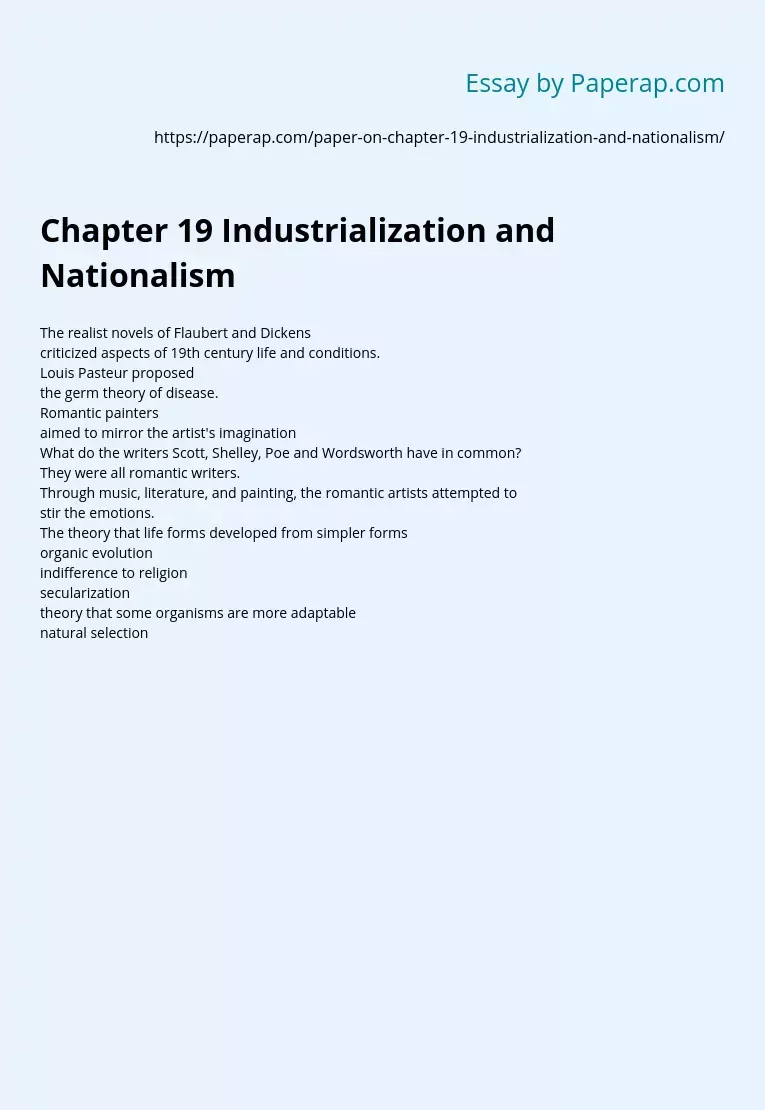Chapter 19 Industrialization and Nationalism
Essay,
Pages 2 (446 words)
Views
21
The realist novels of Flaubert and Dickens
criticized aspects of 19th century life and conditions.
Louis Pasteur proposed
the germ theory of disease.
Romantic painters
aimed to mirror the artist’s imagination
What do the writers Scott, Shelley, Poe and Wordsworth have in common?
They were all romantic writers.
Through music, literature, and painting, the romantic artists attempted to
stir the emotions.
The theory that life forms developed from simpler forms
organic evolution
indifference to religion
secularization
theory that some organisms are more adaptable
natural selection
Literary movement that stressed ordinary characters and precise description
realism
emphasis on using feelings and emotions over reason.
romanticism.
seekers of new business opportunities
entrepreneurs
money supply
capital
production method using rural at home workers
cottage industry
governmental ownership and control of production.
Socialism
invention that improved thread production
spinning jenny
A powerful monarchy
did not contribute to Britain’s Industrial Revolution.
The textile industry met its last major challenge to full mechanization.
with the development and improvements to the steam engine.
The spread of the factory system resulted in
the movement away from home production, the need for more power, and increased exports of British cotton goods.
The Industrial Revolution created new jobs in
railroad construction, coal mining, and factory production.
James Watt
improved the steam engine.
Metternich claimed, after Napoleon’s defeat, that
lawful monarchs should be restored to power.
After Napoleon, France was governed until 1830 by
a king
The peace settlement that followed the defeat of Napoleon was developed at the
Congress of Vienna.
Which of the following was the first president of the 2nd Republic in France?
Louis-Napoleon
In 1848 revolutions took place in
France, Germany and Italy.
Collection of different peoples under the same government, as in the Austrian Empire
a multi-national state.
voting rights for all adult men
universal male suffrage
belief that people should be free from government restaint
liberalism
right of powerful countries to maintain order throughout Europe
Principle of intervention
belief in tradition and social stability
conservatism
German word for emperor
Kaiser
Bismarck’s theory of practical, as opposed to idealistic, governance
realpolitik
reliance on military strength
militarism
law that freed the Russian serfs
emancipation edict
withdraw from or choose not to be part of
secede
The Compromise of 1867
created the dual monarchy of Austria-Hungary, created a single monarch to govern Austria-Hungary, and established a common Austrian-Hungarian Army.
Louis-Napoleon assumed the title of Napoleon III, Emperor of France and at first he
limited civil liberties.
Which of the following was a major threat to American national unity during the 19th century
Slavery
Bismarck faced opposition from
Austria, France and the legislature.
Britain avoided any form of revolution in 1848 by
giving the industrial middle class the vote.
Chapter 19 Industrialization and Nationalism. (2018, Jan 22). Retrieved from https://paperap.com/paper-on-chapter-19-industrialization-and-nationalism/
